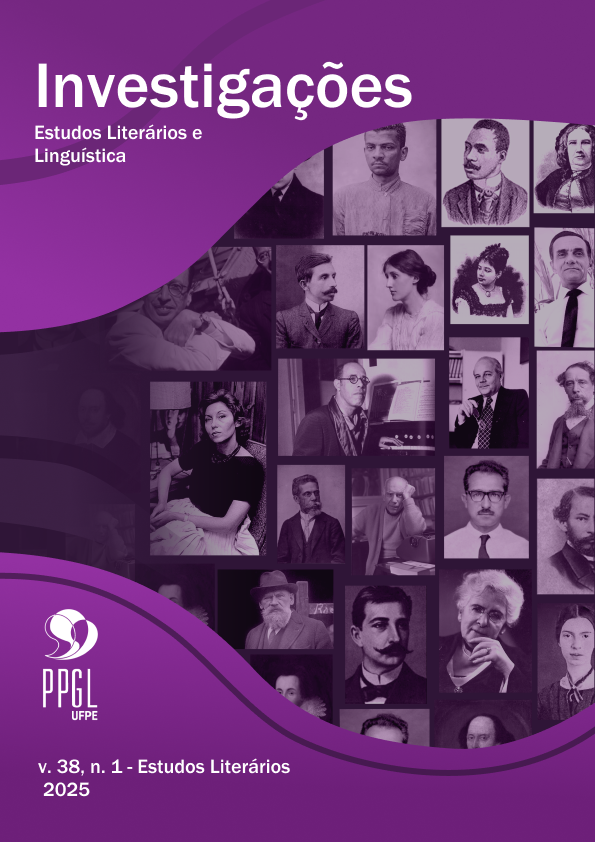Lila, a witch-child: representation of childhood in Elena Ferrante's My brilliant friend
DOI:
https://doi.org/10.51359/2175-294x.2025.265423Keywords:
representation of childhood, witch hunt, contemporary literature by female authors. , Elena FerranteAbstract
We analyze the representation of childhood in Lila, a character from Elena Ferrante's My brilliant friend, a child defined by her irreverence. Since Lila's portrayal often links her to evil, we primarily draw on the studies of Silvia Federici, who argues that the image of the witch was constructed to sustain a capitalist and patriarchal society that required the subjugation of women. Marked by poverty and male violence, Lila grew embittered by her marginalization, developing a sharp and incisive manner of speech. Although she has been described as a "witch-child" for these traits, we argue that she ultimately could not resist the pressures of a community hostile to women.
References
ARIÈS, Philippe. História social da criança e da família. Tradução de Dora Flaksman. 2 ed. Rio de Janeiro: LTC, 2014.
BENJAMIN, Walter. Reflexões sobre a criança, o brinquedo e a educação. Tradução, apresentação e notas de Marcus Vinícius Mazzar, posfácio de Flávio Di Giorgi. 2 ed. São Paulo: Duas Cidades; Editora 34, 2009.
BENJAMIN, Walter. Nápoles. In: BENJAMIN, Walter. Imagens de pensamento / Sobre o haxixe e outras drogas. Tradução de João Barrento. Belo Horizonte: Autêntica, 2013. p. 9-18.
DIMAS, Antonio. Espaço e romance. São Paulo: Ática, 1994.
FEDERICI, Silvia. Mulheres e a caça às bruxas: da Idade Média aos dias atuais. Tradução de Heci Regina Candiani. 1 ed. São Paulo: Boitempo, 2019.
FERRANTE, Elena. L’amica geniale. Roma: Edizione E/O, 2011.
FERRANTE, Elena. A filha perdida. Tradução de Marcello Lino. 1 ed. Rio de Janeiro: Editora Intrínseca, 2016.
FERRANTE, Elena. Dias de abandono. Tradução de Francesca Cricelli. 1 ed. São Paulo: Biblioteca Azul, 2016.
FERRANTE, Elena. Uma noite na praia. Tradução de Marcello Lino. 1 ed. Rio de Janeiro: Editora Intrínseca, 2016.
FERRANTE, Elena. Um amor incômodo. Tradução de Marcello Lino. 1 ed. Rio de Janeiro: Intrínseca, 2017a.
FERRANTE, Elena. Frantumaglia: os caminhos de uma escritora. Tradução de Marcello Lino. 1 ed. Rio de Janeiro: Intrínseca, 2017b. E-book.
FERRANTE, Elena. A vida mentirosa dos adultos. Tradução de Marcello Lino. 1 ed. Rio de Janeiro: Editora Intrínseca, 2020.
FERRANTE, Elena. A amiga genial: infância – adolescência. Tradução de Maurício Santana Dias. 2 ed. Rio de Janeiro: Biblioteca Azul, 2023.
FERRANTE, Elena. História do novo sobrenome: juventude. Tradução de Maurício Santana Dias. 2 ed. Rio de Janeiro: Biblioteca Azul, 2023.
FERRANTE, Elena. História de quem foge e de quem fica: tempo intermédio. Tradução de Maurício Santana Dias. 2 ed. Rio de Janeiro: Biblioteca Azul, 2023.
FERRANTE, Elena. História da menina perdida: maturidade – velhice. Tradução de Maurício Santana Dias. 2 ed. Rio de Janeiro: Biblioteca Azul, 2023.
FERRANTE, Elena. As margens e o ditado: sobre os prazeres de ler e escrever. Tradução de Marcello Lino. 1 ed. Rio de Janeiro: Intrínseca, 2023. E-book.
FERRANTE, Elena. Fever. Direção: Giacomo Durzi. Produção: Alessandra Acciai, Giorgio Magliulo, Roberto Lombardi. Roteiro: Laura Buffoni, Giacomo Durzi. Itália: Malia, QMI, MiC, Film Commission Regione Campania, Sky Arte, RAI, 2017.
GOETHE, Johann Wolfgang von. Fausto. Uma tragédia. Primeira parte. Tradução de Jenny KLABIN SEGALL. Apresentação, comentários e notas de Marcus Vinícius MAZZARI. Ilustrações de Eugène Delacroix. Edição bilíngue. São Paulo: Editora 34, 2004.
MENON, Maurício Cesar. Da Bruxa na Literatura Brasileira do Século XIX. XI Congresso Internacional da ABRALIC – Tessituras, Interações, Convergências. São Paulo: USP, 2008.
SECCHES, Fabiane. Elena Ferrante: uma longa experiência da ausência. São Paulo: Claraboia, 2020.
Downloads
Published
Versions
- 2025-05-28 (2)
- 2025-05-19 (1)
How to Cite
Issue
Section
License
Copyright (c) 2025 Bruna Fontes Ferraz, Eduarda Duarte Pena

This work is licensed under a Creative Commons Attribution 4.0 International License.
Authors who publish with Revista Investigações agree to the following terms:
Authors retain copyright and grant the journal right of first publication with the work simultaneously licensed under the Creative Commons Attribution 4.0 International (CC BY 4.0) license that allows others to share the work with an acknowledgement of the work's authorship and initial publication in this journal.
Authors are able to enter into separate, additional contractual arrangements for the non-exclusive distribution of the journal's published version of the work (e.g., post it to an institutional repository or publish it in a book), with an acknowledgement of its initial publication in this journal.
You are free to:
Share — copy and redistribute the material in any medium or format for any purpose, even commercially.
Adapt — remix, transform, and build upon the material for any purpose, even commercially.
The licensor cannot revoke these freedoms as long as you follow the license terms.
Under the following terms:
Attribution — You must give appropriate credit , provide a link to the license, and indicate if changes were made . You may do so in any reasonable manner, but not in any way that suggests the licensor endorses you or your use.
No additional restrictions — You may not apply legal terms or technological measures that legally restrict others from doing anything the license permits.

